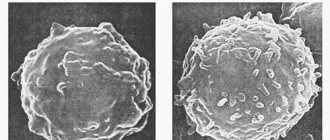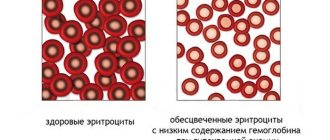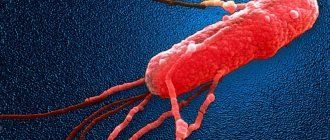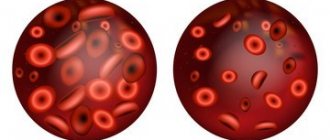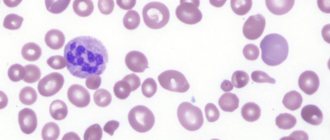Kidneys are paired organs that filter the blood from metabolic end products, as well as toxic substances that enter the body from the outside. During the filtration process, urine is formed, along with which these harmful substances are eliminated. In addition, the kidneys are part of the endocrine system, taking part in the synthesis of certain hormones. They are also involved in protein and carbohydrate metabolic metabolism.
Kidney failure is a disease in which these organs lose the ability to sufficiently perform their function.
Uremia occurs - poisoning of a person with toxic metabolic products, failure of the acid-base and water-salt balance, and as a result - disruption of the functioning of the entire body.
Kidney failure is a dangerous disease with a high risk of mortality. which requires immediate medical intervention and strict monitoring.
Causes
The causes of renal failure most often lie in chronic kidney pathology, in which the organ’s own cells are slowly destroyed and replaced with fibrous tissue:
- urolithiasis disease;
- pyelonephritis;
- tumors of the urinary system;
- glomerulonephritis;
- renal vein thrombosis;
- hydronephrosis.
Other pathologies may also be responsible for functional renal failure:
- diabetes;
- high blood pressure;
- infectious diseases;
- frostbite and burns;
- poisoning with toxic substances;
- overdose of medications;
- shock of any origin (traumatic, surgical, cardiogenic, anaphylactic);
- polymetabolic syndrome;
- abnormal fluid loss (through the skin or kidneys);
- obstetric complications (septic abortion);
- dehydration due to uncontrollable vomiting and diarrhea;
- peritonitis;
- massive blood loss;
- blockage of the urinary ducts.
Very rarely, the cause of the disease is hereditary abnormalities.
Kidney functions
excretory
The nephrons (the structural units of the kidneys) filter the blood, resulting in the formation of urine.
Excreted in urine:
- Protein metabolism residues: urea, creatinine, ammonium salts, sulfuric, phosphoric, uric acids.
- Excess water, salts, micro- and macro-elements, glucose.
- Hormones.
- Harmful substances of third-party origin, including medications.
Homeostatic
Homeostasis means the balance of the internal environment of the body. The amount and ratio of vital substances (for example, water, sodium, potassium, etc.) can fluctuate only within limited limits - even a slight imbalance leads to disease.
The kidneys “monitor” that the amount of substances excreted corresponds to the amount of substances received. This maintains water-salt, acid-base, electrolytic, and osmotic homeostasis. This means that a constant volume of blood, external and intracellular fluid is ensured, the uninterrupted flow of metabolic processes is ensured, and a normal level of blood pressure is maintained.
Endocrine
This is the synthesis of some biologically active substances and hormones.
For example, the kidneys produce the hormone erythropoietin, which stimulates the production of red blood cells in the bone marrow. They also complete the formation of active vitamin D3 (calcitriol), which forms bone tissue.
Metabolic
Participation in the breakdown of proteins and the construction of part of cell membranes. Synthesis of glucose from other substances.
Symptoms
Signs of renal failure depend on the stage at which the pathological process is located. The initial phase does not manifest itself in anything. During this period, the patient complains only about the symptoms of the leading disease.
The first clear signs of kidney failure appear at the oliguric stage. It is characterized by a decrease in the daily volume of urine and disturbances in the water-salt balance, which is expressed by the following symptoms:
- deterioration of general health, weakness, lethargy, loss of performance;
- low temperature;
- shortness of breath, bradycardia, arrhythmia;
- skin itching;
- anemia;
- increased blood pressure;
- loss of appetite, vomiting, nausea, bloating;
- convulsive muscle twitching.
Pain in renal failure can be localized in the lumbar region, spread across the abdomen or concentrated in one side. It all depends on the cause that provoked the functional impairment of the kidneys and the number of affected organs.
The acute stage of the disease lasts 7–14 days, then the recovery phase begins, during which the patient’s condition gradually improves. During the same period, the amount of urine discharge can significantly exceed the norm.
The final restoration of kidney function lasts 8–12 months. If during the acute course of the disease most of the parenchyma was excluded from work, then complete rehabilitation is impossible.
Among women
Symptoms of kidney failure in women are very specific. Even at the latent stage, emotional imbalance develops, caused by a disorder in progesterone synthesis.
Representatives of the fair sex become extremely quarrelsome, touchy and whiny. Possible disturbance of the monthly cycle, prolonged intermenstrual bleeding, insomnia. Frequent changes in blood pressure cause headaches and fainting, constipation, bloating, and gas. Ladies of thin build often suffer from impaired thermoregulation.
In men
The symptoms of kidney failure in men are not particularly noticeable. At the initial stage, the amount of urine decreases, skin itching, diarrhea occurs, and signs of a central nervous system disorder may appear.
Decoding the results
Blood biochemistry will produce a set of results that can be presented in the range of normal values. When the results of the analysis are deciphered, reference values for the age parameters of the patients are included in it.
Norm of indicators
For the convenience of displaying the average range of optimal sample values, quantitative values of the international level have been established - micromoles per liter, in an abbreviated version represented by the designation µmol/l. The normal urea value for men is from 2.8 to 8.1, creatinine should be 44 - 110, uric acid - 210 - 420.
For female patients and children, these values are slightly different. Their values are presented in the table:
| Indicator name | Women | Children under fifteen years of age | Children under one year old | Babies |
| urea | 2 – 6.5 | 1.8 – 5.1 | 1.4 – 5.4 | 1.8 – 5.1 |
| creatinine | 44 — 104 | 27 — 88 | 21 — 55 | 12 — 48 |
| uric acid | 140 — 350 | 140 — 340 | 120 — 340 | 143 — 340 |
Deviations from the norm
The levels of deviation values make it possible to select the necessary therapeutic course. If the ability of the kidneys to remove processed substances from the body is impaired, the level of urine metabolites deviates from the normal level. Substances pass into the blood and accumulate there. An increase or decrease in the level of substances confirms that certain pathologies are developing in the body:
- An increase in creatinine indicates a long period of insufficient kidney function, the cause of which was urolithiasis, diabetes mellitus, tissue inflammation, damage to toxins, and polycystic disease.
- A decrease in creatinine will indicate serious abnormalities in the liver. This may be caused by prolonged immobilization of the patient, exhaustion of the body.
- Increased urea is detected during cirrhosis, malignant tumors, and diseases of the digestive system.
- A low urea value indicates pathologies that cause an increase in creatinine.
- A high level of acid in the urine occurs in alcoholics who suffer from HIV, with severe toxicosis at the initial stage of pregnancy.
- A decrease in uric acid data means that an acute form of tuberculosis, pathology of the liver and biliary tract is developing in the body.
If you have the slightest suspicion of certain failures, you should immediately contact a specialist. Indicators deviating from the norm are manifested by malnutrition and confirm the occurrence of the disease.
Kinds
There is no generally accepted classification of the disease. Most of the known taxonomies distribute the symptoms of renal failure according to the rate of increase in disorders and the severity of symptoms.
On this basis, the following classification of malaise has been adopted:
- acute renal failure (ARF) - manifests itself as a sudden deterioration in health and rapidly increasing symptoms. Despite the severity of the condition, the pathology is completely curable with adequate therapy;
- Chronic renal failure (CRF) develops slowly, sometimes without showing anything for years. The gradual death of nephrons leads to complete disruption of kidney function and intoxication of the body.
In chronic forms of insufficiency, even adequate treatment will not be able to restore kidney function.
Degrees
Among domestic specialists, the urological classification developed in 1973 by I. N. Kuchinsky and N. A. Lopatkin is considered the most complete and verified.
The proposed systematization divides renal failure into 4 stages:
- latent;
- compensated;
- intermittent;
- terminal.
Latent or stage 1 of the disease does not manifest itself in any way. The patient complains of fatigue, loss of performance and weakness, associating these symptoms with ordinary malaise, a cold or PMS. However, even in the absence of signs of disease, pathological changes begin to occur in the body.
The compensated stage is manifested by minor disturbances in the activity of the kidneys: the daily volume of urine increases, the urge to urinate becomes more frequent, and the osmolarity of urine decreases. Fading kidney functions at this stage are compensated by other organs, so proper treatment can keep the disease within certain limits and prevent it from moving to the next stages.
Intermittent renal failure manifests itself with a more intense clinical picture. The symptoms become brighter, the condition of the skin changes - the dermis becomes sallow in color and sags. As a rule, stage 3 renal failure is accompanied by nocturia and polyuria, the patient becomes susceptible to all kinds of infections, weakness and joint pain appear.
The terminal stage largely depends on the degree of damage to the main body systems. As medical practice shows, several years may pass from the moment the last phase is identified before the use of hemodialysis. In this regard, Soviet scientists created another classification, dividing the terminal stage into several degrees of renal failure.
Preparation and technique for taking a blood test
Biochemistry with kidney tests requires the following conditions:
- Come to the laboratory on an empty stomach in the morning.
- Avoid alcohol intake for 1 day.
- Smoking is prohibited 1 hour before the procedure.
- After the last meal, the time interval is 12 hours.
- Before collecting material, drinking juices, tea, and coffee is prohibited.
- Psycho-emotional stress is excluded.
- Excessive physical activity is unacceptable.
Venous blood is required to analyze kidney function tests. When performing venipuncture, the patient is in a lying or sitting position. As a standard, blood is drawn from the cubital vein directly into a test tube. It is advisable to use special disposable polymer tubes to avoid distortion of the research results. Renal tests require serum, which is obtained by centrifugation of whole blood. The resulting material is analyzed using special diagnostic equipment. Laboratory analyzers differ from each other, so results may be given in different units of measurement. Only an experienced, highly specialized doctor can correctly interpret biochemical blood parameters.
Diagnostics
Diagnosing renal failure is often difficult. It is especially difficult to identify the chronic form of the disease. In order not to make a mistake in diagnosis, the patient is prescribed a number of laboratory and instrumental measures.
The main and most reliable tests for renal failure are urine tests: general, according to Nechiporenko and Zimnitsky.
In addition, the patient is sent for additional examinations:
- TANK;
- MRI;
- radioisotope scanning;
- Ultrasound of the kidneys;
- study of the fundus;
- ECG;
- Doppler ultrasound;
- CT;
- biopsy.
General and biochemical blood tests and chromocystoscopy are required. Data from previous studies are used to differentiate the underlying cause of renal failure. However, at the intermittent and terminal stages, analyzes are no longer indicative.
Type of kidney tests
It should be noted that this type of test is not the final result. After conducting a profile study, the specialist begins to calculate functional samples. They show much more accurately the performance of the organs that excrete urine. To calculate the level of substances in the blood, it is necessary not only to know their main indicators, but also to take into account some parameters:
- gender of the patient;
- body weight;
- age category.
As a result, more clear results can be obtained for a specific person based on his individual indicators and all his deviations can be identified.
Treatment
Treatment of acute renal failure is performed in a hospital. The patient, who is in serious condition, is placed in intensive care.
For chronic disease, therapy is prescribed depending on the degree of kidney damage. At an early stage, the underlying disease is stopped. In most cases, this allows you to cope with the functional disorder and avoid complications.
When symptoms of kidney failure appear, specific treatment is carried out: remove blockage of the ureters, replenish the loss of plasma, use antiarrhythmic and cardiac drugs.
Drugs for kidney failure:
- medications that improve blood circulation - Dopamine;
- diuretic tablets - Lasix, Furosemide, Hypothiazide, Diacarb, Trigrim;
- plasma replacement drugs - Reogluman, Sorbilact. Solutions are administered intravenously through droppers or injections;
- sorbents - Filtrum-STI, Enterodes;
- blood pressure pills - Enalapril, Captopril, Adelan.
For autoimmune diseases and glomerulonephritis, glucocorticosteroids are prescribed - Prednisolone. Anemia is combated by subcutaneous administration of Epovitan.
Antibiotics for renal failure are used if the cause of the illness is sepsis, pyelonephritis or another infectious pathological process. The most effective and safe in this case are Cefepime and Cefaclor.
If medications for renal failure do not have the expected effect and symptoms continue to develop, the patient is transferred to hemodialysis or undergoes an organ transplant.
Treatment with folk remedies
If kidney function is impaired, medicinal herbs with diuretic properties have a good effect. Infusions and teas are prepared from plants, and decoctions are added to a warm bath.
Best herbs for kidney failure:
- lingonberry leaf;
- bearberry;
- corn silk;
- chamomile;
- horsetail;
- birch leaves and buds.
It is recommended to brew herbal infusions in a thermos and take them hot at least 3 times a day. It should be remembered that herbal medicine is used only as an adjuvant to drug treatment and must be prescribed by a doctor. In some conditions of the body, herbs are contraindicated.
Do I need to prepare for the study?
Each analysis requires at least some preparation, otherwise the indicators will be distorted or completely inaccurate. It must be remembered that blood will be tested. Before a kidney test, a certain list of measures should be followed:
- For a couple of weeks, you should stop taking medications that can distort the readings. The doctor tells the patient what medications are allowed to be taken and what is strictly prohibited.
- Before testing, you must adhere to a certain diet for a week, limiting yourself to fried and fatty foods.
- Two days before the test, stop drinking alcoholic beverages and also avoid smoking. Physical activity is also contraindicated.
- You cannot eat food twelve hours before, because the analysis is done on an empty stomach. You can only drink filtered water.
- For thirty minutes, the patient needs to rest so that no traces of physical or mental stress remain in the body - blood is donated in a calm state.
After delivery, the analysis is processed within 24 hours, its results can be clarified with the attending physician. They perform diagnostics and determine your next steps, which will be aimed at adhering to the therapeutic course. How to collect urine
Complications
The most common complications of kidney failure are infectious diseases (sepsis), cardiovascular disorders and uremic coma.
How long do people live with kidney failure? It is difficult to answer this question. It all depends on the degree of organ damage and the presence of complications or concomitant pathologies. It is also important which disease caused the functional deficiency.
If we talk about approximate data, the statistics are as follows: patients receiving replacement therapy live 5–7 years. Hemodialysis prolongs life by 22–23 years. If the kidneys fail, a transplant is performed, which adds at least 25 years to life.
What does a doctor do first during an appointment?
A kidney examination is carried out by a nephrologist - a doctor who treats pathologies of this organ. You can come to see him either independently or with a referral from a therapist/urologist. After collecting anamnesis, the doctor examines the person using palpation and percussion. During this test, the area where the kidneys are located is felt and tapped. With the help of palpation, you can determine the prolapse of the kidney, and pain when pressing or tapping will be evidence of problems with the organ.
After the examination, the nephrologist will tell you where to start the diagnosis. Its stages and methods depend on the diagnosis that the doctor suspects during examination.
Prevention
No special measures have been developed to prevent the pathological condition. Prevention of illness consists of regular examination of people with hereditary kidney diseases. In addition, people who have suffered a severe burn, frostbite, or injury to the lower back should see a doctor immediately.
If treatment is started in a timely manner, the functionality of the organs may not be affected or the disorders will not be so complex.
Kidney failure is not a death sentence. Even at the terminal stage of the disease, when the patient is on hemodialysis or waiting for an organ replacement, all is not lost. The desire to live, coupled with well-chosen therapy, will defeat any pathological process.

